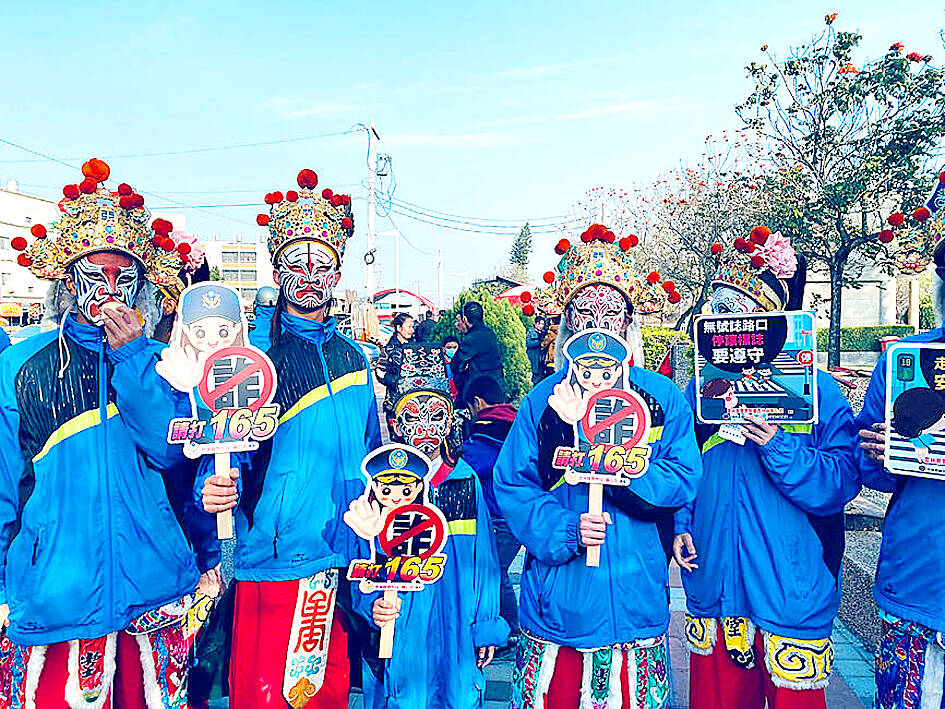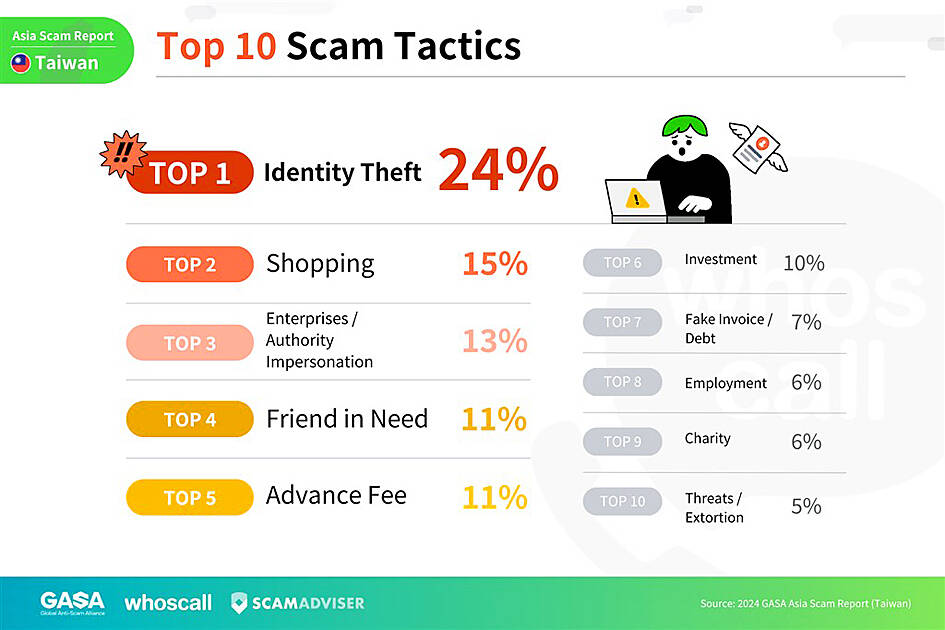People in Taiwan might have lost as much as NT$239.5 billion (US$7.52 billion) to scams over the past 12 months, an anti-scam research report released on Monday showed, based on a survey of people in East, Southeast and South Asia.
The total losses to scams in Taiwan ranked fourth behind those in South Korea, Singapore and Japan, a survey of 13 countries and territories conducted jointly by the Global Anti-Scam Alliance, Gogolook and ScamAdviser, a Web site legitimacy checker, showed.
The total losses in Taiwan was estimated proportionally from a survey of 5,003 Taiwanese, who each lost an average of US$1,940 to scammers, amounting to 1 percent of Taiwan’s GDP last year.

Photo courtesy of the Yunlin County Police Department
The survey, which collated responses from about 25,000 respondents over three-day periods in June and July, was also conducted in China, Hong Kong, India, Indonesia, Malaysia, Pakistan, the Philippines, Thailand and Vietnam, said Kara Yang (楊莞儀), a PR staffer at Whoscall, an app developed by Gogolook.
The US$1,940 loss per capita represented a 67.7 percent increase from the previous year, second only to South Korea, where individual scam losses nearly doubled from US$1,384 to US$2,738 during the same period, Yang said.
Only 2.74 percent of Taiwanese — the lowest of any group of respondents — said they would be willing to accept an offer to receive US$20,000 on the condition that they send US$19,000 to another bank account and keep the remaining US$1,000, the survey showed.

In contrast, 20.8 percent of Indians would consider participating in such a scheme, the highest in Asia.
While only 17 percent of Taiwanese respondents said they were “not confident at all” in their ability to recognize scams, the share of those who felt “confident” or “very confident” dipped to 55 percent, down 5 percentage points from the previous year.
Whether that decline was caused by the growing use of artificial intelligence (AI) was not specified, but at least 65 percent of respondents said they were aware of the use of AI in scams such as generating dialogues, mimicking voices or creating images and videos.
Meanwhile, phone calls and social media posts have overtaken text/SMS messages as the most common scam delivery methods, with social media scams ballooning to 55 percent, an increase of 21 percent from last year.
Among all social media platforms, Facebook had the highest rate of exposure to scams (63 percent) for two years in a row, where scam tactics primarily involve fake investment experts or analysts luring victims to invest in or purchase fraudulent financial products.
The most common type of scam in Taiwan was identity theft, with 24 percent of victims having experienced it, the survey showed.
The primary way of paying scammers was through bank transfers at 39 percent, the survey showed.
Only 6 percent of Taiwanese have gotten their money back after being scammed, the survey showed.
Meanwhile nearly 30 percent said they would not report being scammed because the procedures were too complicated and they did not believe it would help even if they did report it.
An initial version of the study was released based on countries and areas, Yang said, with a more comprehensive version set to be published later this month.

TRUST: The KMT said it respected the US’ timing and considerations, and hoped it would continue to honor its commitments to helping Taiwan bolster its defenses and deterrence US President Donald Trump is delaying a multibillion-dollar arms sale to Taiwan to ensure his visit to Beijing is successful, a New York Times report said. The weapons sales package has stalled in the US Department of State, the report said, citing US officials it did not identify. The White House has told agencies not to push forward ahead of Trump’s meeting with Chinese President Xi Jinping (習近平), it said. The two last month held a phone call to discuss trade and geopolitical flashpoints ahead of the summit. Xi raised the Taiwan issue and urged the US to handle arms sales to

A magnitude 5.6 earthquake struck off the coast of Yilan County at 12:37pm today, with clear shaking felt across much of northern Taiwan. There were no immediate reports of damage. The epicenter of the quake was 16.9km east-southeast of Yilan County Hall offshore at a depth of 66.8km, Central Weather Administration (CWA) data showed. The maximum intensity registered at a 4 in Yilan County’s Nanao Township (南澳) on Taiwan’s seven-tier scale. Other parts of Yilan, as well as certain areas of Hualien County, Taipei, New Taipei City, Taoyuan, Hsinchu County, Taichung and Miaoli County, recorded intensities of 3. Residents of Yilan County and Taipei received

Taiwan has secured another breakthrough in fruit exports, with jujubes, dragon fruit and lychees approved for shipment to the EU, the Ministry of Agriculture said yesterday. The Animal and Plant Health Inspection Agency on Thursday received formal notification of the approval from the EU, the ministry said, adding that the decision was expected to expand Taiwanese fruit producers’ access to high-end European markets. Taiwan exported 126 tonnes of lychees last year, valued at US$1.48 million, with Japan accounting for 102 tonnes. Other export destinations included New Zealand, Hong Kong, the US and Australia, ministry data showed. Jujube exports totaled 103 tonnes, valued at

BIG SPENDERS: Foreign investors bought the most Taiwan equities since 2005, signaling confidence that an AI boom would continue to benefit chipmakers Taiwan Semiconductor Manufacturing Co’s (TSMC, 台積電) market capitalization swelled to US$2 trillion for the first time following a 4.25 percent rally in its American depositary receipts (ADR) overnight, putting the world’s biggest contract chipmaker sixth on the list of the world’s biggest companies by market capitalization, just behind Amazon.com Inc. The site CompaniesMarketcap.com ranked TSMC ahead of Saudi Aramco and Meta Platforms Inc. The Taiwanese company’s ADRs on Tuesday surged to US$385.75 on the New York Stock Exchange, as strong demand for artificial intelligence (AI) applications led to chip supply constraints and boost revenue growth to record-breaking levels. Each TSMC ADR represents